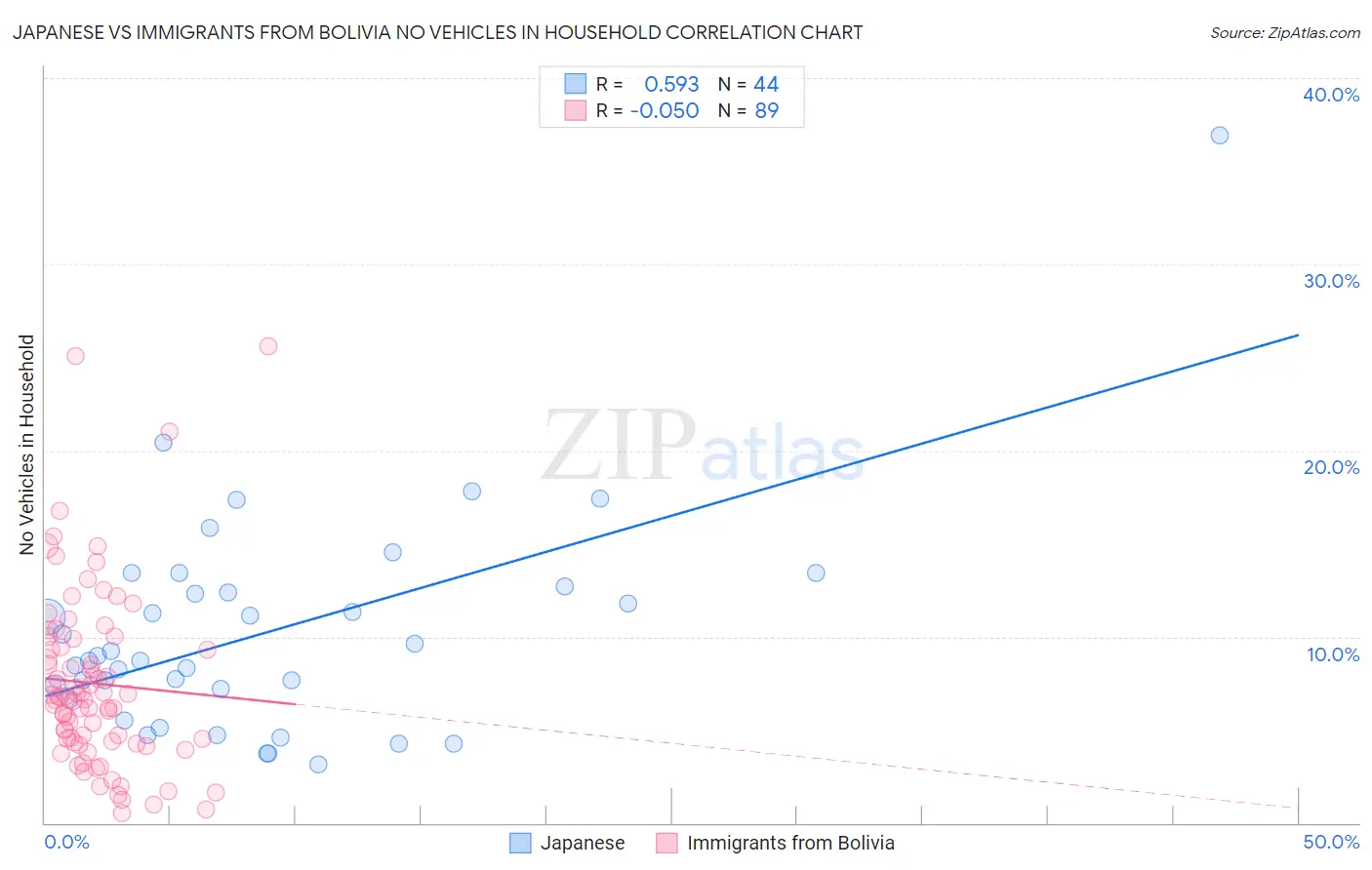Japanese vs Immigrants from Bolivia No Vehicles in Household
COMPARE
Japanese
Immigrants from Bolivia
No Vehicles in Household
No Vehicles in Household Comparison
Japanese
Immigrants from Bolivia
9.4%
NO VEHICLES IN HOUSEHOLD
94.1/ 100
METRIC RATING
116th/ 347
METRIC RANK
8.9%
NO VEHICLES IN HOUSEHOLD
98.7/ 100
METRIC RATING
96th/ 347
METRIC RANK
Japanese vs Immigrants from Bolivia No Vehicles in Household Correlation Chart
The statistical analysis conducted on geographies consisting of 248,891,204 people shows a substantial positive correlation between the proportion of Japanese and percentage of households with no vehicle available in the United States with a correlation coefficient (R) of 0.593 and weighted average of 9.4%. Similarly, the statistical analysis conducted on geographies consisting of 158,658,153 people shows a slight negative correlation between the proportion of Immigrants from Bolivia and percentage of households with no vehicle available in the United States with a correlation coefficient (R) of -0.050 and weighted average of 8.9%, a difference of 6.4%.

No Vehicles in Household Correlation Summary
| Measurement | Japanese | Immigrants from Bolivia |
| Minimum | 3.2% | 0.50% |
| Maximum | 36.9% | 25.6% |
| Range | 33.7% | 25.1% |
| Mean | 10.2% | 7.5% |
| Median | 8.9% | 6.8% |
| Interquartile 25% (IQ1) | 6.9% | 4.4% |
| Interquartile 75% (IQ3) | 12.6% | 9.6% |
| Interquartile Range (IQR) | 5.6% | 5.3% |
| Standard Deviation (Sample) | 5.9% | 4.8% |
| Standard Deviation (Population) | 5.8% | 4.8% |
Demographics Similar to Japanese and Immigrants from Bolivia by No Vehicles in Household
In terms of no vehicles in household, the demographic groups most similar to Japanese are Navajo (9.4%, a difference of 0.070%), Serbian (9.4%, a difference of 0.13%), Immigrants from Netherlands (9.4%, a difference of 0.56%), Armenian (9.4%, a difference of 0.66%), and Immigrants from Kuwait (9.4%, a difference of 0.74%). Similarly, the demographic groups most similar to Immigrants from Bolivia are Immigrants from Central America (8.9%, a difference of 0.66%), Slavic (9.0%, a difference of 0.97%), Bulgarian (9.0%, a difference of 1.0%), Asian (9.0%, a difference of 1.2%), and Pakistani (9.0%, a difference of 1.3%).
| Demographics | Rating | Rank | No Vehicles in Household |
| Immigrants | Bolivia | 98.7 /100 | #96 | Exceptional 8.9% |
| Immigrants | Central America | 98.5 /100 | #97 | Exceptional 8.9% |
| Slavs | 98.4 /100 | #98 | Exceptional 9.0% |
| Bulgarians | 98.4 /100 | #99 | Exceptional 9.0% |
| Asians | 98.3 /100 | #100 | Exceptional 9.0% |
| Pakistanis | 98.3 /100 | #101 | Exceptional 9.0% |
| Yugoslavians | 98.3 /100 | #102 | Exceptional 9.0% |
| Seminole | 98.3 /100 | #103 | Exceptional 9.0% |
| Zimbabweans | 98.0 /100 | #104 | Exceptional 9.0% |
| Spanish Americans | 97.9 /100 | #105 | Exceptional 9.1% |
| Laotians | 97.8 /100 | #106 | Exceptional 9.1% |
| Hispanics or Latinos | 97.7 /100 | #107 | Exceptional 9.1% |
| Mexican American Indians | 97.6 /100 | #108 | Exceptional 9.1% |
| Maltese | 97.6 /100 | #109 | Exceptional 9.1% |
| Delaware | 97.2 /100 | #110 | Exceptional 9.2% |
| Immigrants | Kuwait | 95.1 /100 | #111 | Exceptional 9.4% |
| Armenians | 95.0 /100 | #112 | Exceptional 9.4% |
| Immigrants | Netherlands | 94.8 /100 | #113 | Exceptional 9.4% |
| Serbians | 94.3 /100 | #114 | Exceptional 9.4% |
| Navajo | 94.2 /100 | #115 | Exceptional 9.4% |
| Japanese | 94.1 /100 | #116 | Exceptional 9.4% |